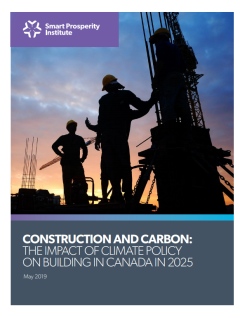
This paper, Construction and Carbon: The Impact of Climate Policy on Building in Canada in 2025, studies the economic impact of climate policies on future carbon prices in the area of construction in Canada, by applying an economic and energy model of the Canadian economy known as gTech.
It is vital that Canada creates jobs and prosperity for Canadians while also meeting our Paris Agreement commitments (at a minimum) on climate change. Governments need to smartly design environmental policies that are effective, affordable and fair, and that minimize damage to the economy. Beyond just damage control, well-designed policies create economic opportunities for Canadian workers and businesses, not just limited to the $26 trillion global opportunity in clean growth.
The question of the economic impact of higher carbon prices on the construction sector is an important one, given that the sector represents 14% of Canada’s GDP, using the North American Industry Classification System (NAICS) definition of construction. Furthermore, the sector employed over 1.4 million Canadians in 2018 and has a significant presence in every province and region in Canada. Given the economic importance of construction and the number of families that rely on construction for jobs and prosperity, governments must be mindful of the impacts any policy has on the sector.
In this study, we take the existing suite of federal and provincial carbon policies, including carbon pricing (cap-andtrade and carbon tax) and increase their stringency over time, allowing Canada to meet our Paris Agreement commitment of a 30% reduction in greenhouse gas (GHG) emissions by 2030 relative to 2005 levels.
